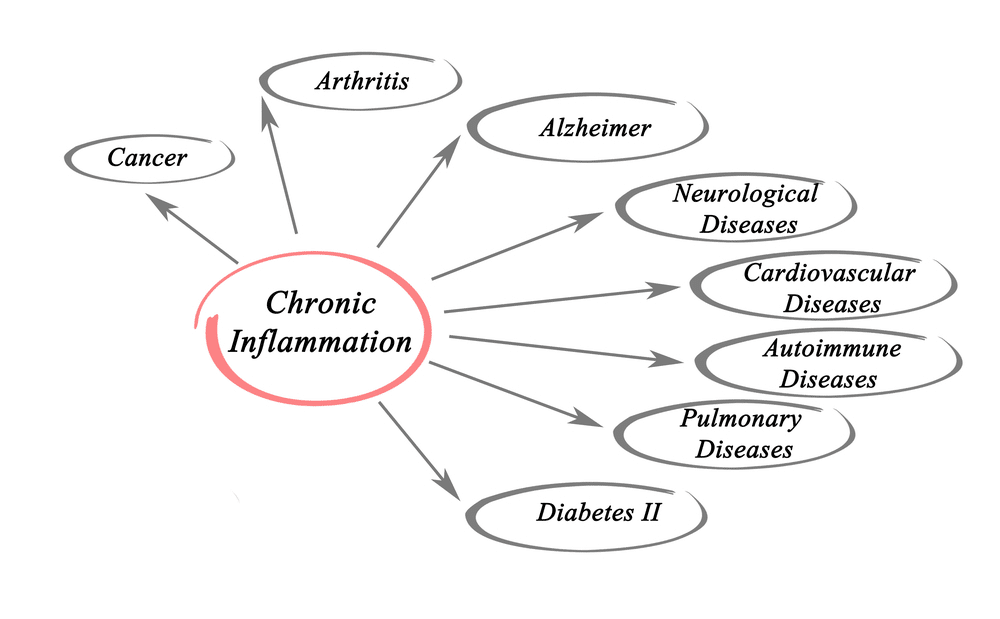Chronic inflammation is one of the deadliest diseases in the world, yet many people don’t even know what it is, much less whether they have it or not. Besides the direct damage it inflicts on the body, this inflammation is a big contributor to most of the chronic diseases that 40% of Americans live with. One Life Health and Performance in Palm Beach Gardens, FL can help you identify and solve this potentially dangerous condition.
What Is Inflammation?
Inflammation, which is characterized by swelling, soreness, redness, or impaired function of an organ – is a defensive maneuver served up by the body’s immune system. It’s a tool that the system uses to identify and heal harmful trouble spots, such as a sprain or bacterial invasion. There are two types of inflammation, but only one of them is healthy:
Acute Inflammation
This is the good kind of inflammation you get temporarily, when you injure yourself or accidentally come in contact with substances that the body identifies as dangerous. Drop a hammer on your toe, brush up against some poison ivy, breathe in smoky air–your body will quickly go to work by sending white blood cells to the rescue, which causes inflammation. Symptoms here usually recede within a few days but can last for weeks.
Chronic Inflammation
This is the bad kind of inflammation. Long-term inflammation can last for months or years. In this situation, the body’s immune system doesn’t have the ability to fully repair damaged tissue, but it keeps sending out antibodies, such as white blood cells, anyway. Because the defenders can’t fix the problem, they crowd themselves around the troubled area and continue to swell. Worse, they sometimes end up attacking healthy tissue as a result of the confusion.
What Are the Effects of Chronic Inflammation?
We all know the signs of obvious inflammation. Yelling for hours at a sporting event or concert will inflame your throat. Twisting your ankle when running will cause swelling and pain. These acute inflammations are readily understandable and often even visible.
Long-term inflammation can have obvious effects as well. However, because we can’t see the internal injury that the immune system is trying to fight, the effects of the inflammation can lead to a wide range of symptoms that often seem to come out of nowhere. Because there’s often no obvious source for that new pain or recent fatigue, we don’t know how to approach treatment. Places where this inflammation often shows up include:
The Gastrointestinal System
Your GI system – stomach, intestines, colon–is one of the most complex networks in the body. In fact, there’s so much more to this system than digestion and elimination that it’s frequently called the second brain by physicians. When you have a “gut feeling” that’s literally your second brain talking, it’s not just a figure of speech.
Long-term inflammation in the gastrointestinal tract can lead to complications that range from annoying to debilitating. Changes in digestion or elimination habits are the tip of the iceberg. Without treatment, the condition can turn into one or more inflammatory bowel diseases (IBD), including ulcerative colitis and the extremely serious Crohn’s Disease.
The Joints
When long-term inflammation touches joints such as the wrist, fingers or knee, there’s swelling and tenderness that doesn’t go away. This results in a type of arthritis, which is a condition that makes life painful and limited for more than 1 in 4 adults in the U.S; more than 54 million people. While the most common type of arthritis – osteoarthritis — is caused by worn tissue, inflamed joints can be just as painful and long-lasting.
Rheumatoid arthritis, psoriatic arthritis, gout, and lupus are just a few of the conditions that can be caused by inflammation in the joints. These diseases occur when the immune system doesn’t work correctly and releases inflammatory agents to a trouble spot. When they reach the joint area they’re supposed to be healing, these agents end up causing more swelling, damage bone and cartilage, and can even produce nerve damage.
The Skin
Skin diseases caused by inflammation are the number one issue seen by dermatologists each year. As with inflammation itself, these conditions occur in both acute (think insect bite or sunburn) and long-term chronic form. Long-term inflammation can be the cause of eczema, psoriasis, rosacea, and other forms of dermatitis. This condition is not at all uncommon, affecting 35 million Americans each year.
Fortunately, inflammatory skin conditions are usually quite visible, even though they are actually being caused by our own autoimmune systems. As a result, these conditions are more easily diagnosed. While the biochemical connections between autoimmune agents and skin tissue are still not completely understood by researchers, the science is clear on the connection between long-term inflammation and these skin conditions.
Energy and Fatigue
When our immune systems are working overtime, as they are in cases of inflammation, our body becomes tired, even when we’re actually sleeping. The extra production of chemical agents goes on 24/7 until the inflammation is resolved, over months and even years. This means that during that time, our body is never really fully resting.
The reason why you feel tired all the time, despite getting enough hours of sleep, may have roots in an inflammatory problem that has not been diagnosed. The connection between inflammation and fatigue is well documented. Clinical evidence even shows a direct correlation between inflammation and chronic fatigue syndrome.
Mental Health
Healthy in mind and body is a state that we all understand. But unhealthiness in the body creates negative effects on our state of mind too. Focus, memory, and other aspects of cognition are all affected by chemical agents that our bodies release in response to stress. Stress, as we all know, is a frequent companion to hectic and uncertain times. It is also a vector for a variety of inflammatory diseases.
Why? Because when you’re stressed the body releases hormones that are geared for “fight or flight” survival. These agents increase energy and literally change our arteries so that blood pumps harder during stress. At the same time, they cut back on what your body believes is a non-essential function, like digestion and immune response. The long term effects of these imbalances lead to mood effects, including depression.
What Can Happen Without Treatment?
One of the most devilish things about inflammation is that it’s often not easy to identify. It is, however, easy to make a startling correlation – inflammation accompanies just about all of the major chronic diseases that 40% of American adults live with. Without treatment, these diseases range from debilitating to deadly. Chronic inflammation is always an accomplice to:
Diabetes
According to the American Diabetes Association, 34 million people live with this serious condition. A number nearly as large may be pre-diabetic and will eventually develop the disease.
Cardiovascular Disease
Responsible for 1 of 3 U.S. deaths each year, cardiovascular disease has an unfortunate connection to long-term inflammation. Autoimmune agents that reach the heart may actually weaken arteries, leading to heart attacks.
Arthritis
While osteoarthritis is the leading form of this joint disease, rheumatoid arthritis represents about 20% of all arthritis sufferers. This condition is caused by inflammation and can be treated.
COPD
Chronic Obstructive Pulmonary Disease is the third leading killer in the US, and as many as 24 million Americans suffer from it. Long-term inflammation of the respiratory system actually destroys breathing ability.
What Can I Do About It?
The first step in solving chronic inflammation is to understand that you may be living with it. While some forms, such as the skin conditions and joint swellings may be obvious markers of inflammation, other symptoms are more subtle. If you’ve been experiencing worrying changes in sleep, energy, focus, or discomfort, you may be living with inflammation.
There are several steps to get you treated from long-term inflammation. Most of them are lifestyle changes that you can take on for yourself, but it all begins with a doctor’s evaluation.
A Medical Checkup
While there is no single test that can accurately diagnose inflammation, there are several blood tests that can shed light on your condition:
Serum Protein Electrophoresis (SPE)
This test measures selected proteins in the blood. If there are too few or too many of these proteins, the results point to potential inflammation and markers for other conditions.
Erythrocyte Sedimentation Rate (ESR)
This blood test is a generalized way to understand if there is inflammation somewhere in the body. The test measures how quickly red blood cells sink when suspended in a test tube with blood.
C-Reactive Protein (CRP)
This is a protein that’s produced by the liver. A high level of CRP in the bloodstream is a good indicator that inflammation is present. In some cases, this is the first part of the discovery and diagnosis process.
Diet
Lifestyle changes, especially in diet, are the best ways you can help your body fight long-term inflammation. Many clinical studies have shown the effects of certain foods on being able to fight inflammation. Fortunately, it’s a big menu and not hard to find foods that you’ll like – and stick with.
Foods That Fight Inflammation:
- Fresh fruits with deep colors like cherries and berries
- Fresh leafy vegetables like spinach and kales
- Whole grains like oatmeal and whole-grain bread
- Fish: Omega 3 fatty acids are fabulous anti-inflammatory agents
- Olive oil, which has the “good” kind of fat that cuts inflammation
Likewise, there are certain types of food that you’ll want to avoid if you want to bring down a problem with chronic inflammation. The last one on the list is controversial, but often the right solution:
Foods You’ll Want to Avoid
- Sweets and Sodas: sugar causes the body to release agents that can inflame
- Processed meat has lots of saturated fat which causes inflammation
- High-fat foods such as cold cuts and bacon; make them occasional
- Anything with trans fats, including artificial dairy products (creamers, etc.)
- Gluten: for many people, a change to gluten-free grains is revelatory
What Can I Do About It?
Getting rid of inflammation is a major step toward regaining your health and wellness. The range of reasons why you may be experiencing inflammation is too broad to be addressed in a single article, but the end result of solving it is often the same happy ending. You can relieve pain, get better sleep, digest meals better, and have more energy and focus when you solve an inflammation condition.
Arriving at this optimized state of wellness is a joint effort between you and our medical professional team. Our doctors will conduct a thorough examination, listen to you and your symptoms, and conduct state-of-the-art testing for inflammation disorders. Then, we’ll help you assemble a dietary game plan that will help keep your condition in check and allow the rest of your body and mind to thrive.
Come visit us at One Life Health and Performance in Palm Beach Gardens, FL. We’ll help you get your inflammation under control and get you back to your best self.





